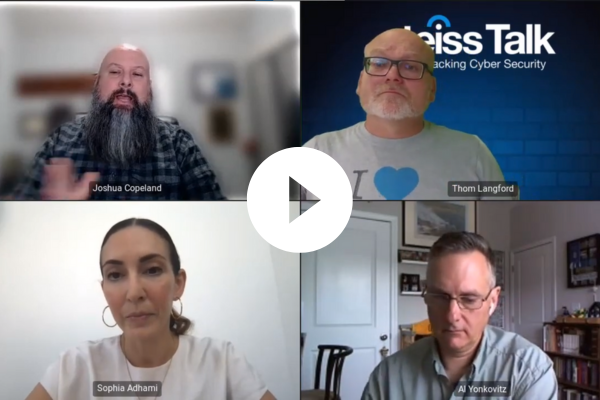There’s no business case for cancelling DEI
With the cyber-security sector already reaping the benefits of established practices and partnerships geared towards employing more women and neurodiverse people in tech roles, other sectors struggling with skills shortages are likely to follow suit

Political resistance to DEI has grown in some quarters – particularly following reactionary executive orders limiting DEI programs in both the public and private sector, spurred by the return of Donald Trump to the Oval Office. But this backlash ignores the very real, business-driven benefits that inclusive practices bring industries struggling with acute skills shortages.
This is particularly true of the cyber-security sector, which has already made great strides in inclusive employment practices thanks to tailoring job interviews, working environments and codes of conduct at the workplace to better accommodate neurodiverse individuals.
Positive trends in the sector were already highlighted in a report published by the National Cyber Security Centre (NCSC) a few years ago, where 19 per cent of the cyber-professionals participating in the survey identified as neurodiverse – exceeding their estimated 15 per cent representation in the general population.
While this is, no doubt, a positive trend, there is still an untapped pool of neurodiverse cyber-talent out there waiting to be leveraged by the sector.
Framing gender as a form of neurodiversity
While neurodiversity is traditionally associated with cognitive differences related to conditions such as autism, ADHD and dyslexia, in a broader sense it is a shorthand for stating the obvious: individual human brains function differently.
Applied to groups in a workplace context rather than individuals, this translates into women’s general cognitive attitudes and preferences diverging from the laddish, male-dominated culture of the tech sector and the cyber-industry in particular.
But, as Rik Ferguson, a chair of the keynote stage at Infosecurity Europe 2025 pointed out in a fireside chat, empowering women in information security is not about positive discrimination – a term that often triggers resistance – but about rectifying bad practices.
Just as dimming lights or minimising noise can help neurodiverse employees function better, the management’s allyship in softening hyper-masculine workplace cultures can help women feel more comfortable and able to contribute fully.
Confidence also remains a critical barrier for many women in the sector. It’s well documented that women tend to apply for a job only if they meet almost all the stated requirements, while men often apply when they meet just a little over half.
Women’s propensity to suffer from impostor syndrome is another sign that they are more susceptible to doubting their own capabilities than men are. As a result, they may need more pep talk and persuasion to become leaders and excel in executive roles even when they have the right skillset.
Building women’s confidence through mentoring, networking and exposure to role models can have a powerful effect – particularly when done in a non-patronising way.
There are some subtle but rather impactful methods: networking opportunities with women in leading cyber-security or other technical roles; membership in affinity groups or listening to women from the top echelons of the industry with a mission to share the lessons they have learned with their female industry peers.
What can employers do to attract female cyber security talent?
To engage and retain more women in their cyber security function, employers need to adopt a multi-pronged approach.
It was clear from Infosecurity Europe’s Women in Cyber discussion, too, that motherhood and the caregiving responsibilities traditionally left to women, often isolate them from the workforce unless proper support is in place. There was common agreement among the panellists in how staying in touch with employers and professionals of the industry eased them back into the labour market from maternity leave.
Also, any caregiving benefits – whether it’s back-up daycare, discounts towards its costs or assistance with elder care – provided by the employer can help a woman to strike a better work-life balance and performance at work.
Larger companies are often in a better position to set up gender equity networks (GENs) or employee resource groups (ERGs), which create safe spaces for networking and advocacy.
Meanwhile, small and medium sized businesses with less scope for DEI programmes can refer their employees to external platforms and opportunities – such as the UK chapter of the global Woman in Tech movement, with its mission to empower women in tech through leadership development, professional growth, mentorship and networking events.
Another positive example is data solutions provider LexisNexis Reed Tech’s Women in Technology Community and Mentoring Programme, which, as well as offering free support at different stages of their careers, connects women with external mentors via experts or its self-service platform.
In 2025, cyber-security and cloud computing company Akamai Technologies hosted its second virtual hackaton for women developers with up to six years’ of experience – an event that doesn’t only provide women with an opportunity to flaunt their coding skills but also equips winners with credentials that may lead them to high-status cyber-security roles.
Employers who embrace neurodiversity and want to raise awareness of DEI in fresh, unorthodox ways can also contact Hustle Crew, a careers community and training company that has workshops and talks on offer. A play, The First Woke War, written by Hustle Crew’s Founder Abadesi Osunsade, can be customised to reflect the specific workplace challenges in inclusion faced by each client organisation.
These are just a selection of programmes offered by the businesses whose CISOs and top executives participated in the Women in Cyber-security section of Infosecurity Europe 2025.
This rising availability and popularity of women-in-tech programmes suggests that, much like World War II opened up the labour market to women as a result of male workforce shortages, the current digital skills gap is creating an opportunity for a lasting transformation of who works in tech.
Organisations such as BAE Systems, BT and Vodafone, which have already actively hired from Code First Girls’ pool of over 200,000 trained women coders, have no reason to abandon their DEI efforts when they are filling roles with qualified recruits – unless legally compelled to do so.
Even companies that have not yet embraced DEI but are struggling to find talent will likely follow suit, as the benefits become more and more obvious. Once this trend reaches critical mass, market forces can be expected to drive the adoption of DEI practices even further.
Most Viewed
Complexity in compliance: how critical organisations can proactively keep ahead of threats in turbulent timesSponsored by Check Point Software
Developing the foundations of resilienceSponsored by Zscaler
The necessity of API security for B2B fintechsSponsored by Raidiam
Rising from the ashesSponsored by Zscaler
Building a resilient mindsetSponsored by Zscaler
The Expert View: The Future of Network Security in the Age of AISponsored by BT & Fortinet
Winston House, 3rd Floor, Units 306-309, 2-4 Dollis Park, London, N3 1HF
23-29 Hendon Lane, London, N3 1RT
020 8349 4363
© 2025, Lyonsdown Limited. teiss® is a registered trademark of Lyonsdown Ltd. VAT registration number: 830519543




